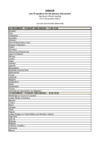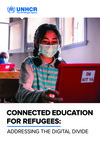Violence in northern Mali forces over 20,000 into exile
This is a summary of what was said by UNHCR spokesperson Adrian Edwards – to whom quoted text may be attributed – at today's press briefing at the Palais des Nations in Geneva.
UNHCR has deployed emergency teams to countries surrounding Mali to help meet the needs of some 20,000 people who have been forced to flee fighting in northern Mali. Most of the displaced are in Niger, Burkina Faso and Mauritania.
Fighting between rebel Tuareg groups and governmental forces in the Azawad region of northern Mali began in mid-January.
In the past three weeks, at least 10,000 people are reported to have crossed to Niger, 9,000 have found refuge in Mauritania and 3,000 in Burkina Faso.
In Niger, most of the new arrivals are from Menaka in Mali. Some have settled very close to the volatile border. Many of the new arrivals are sleeping in the open and have little access to shelter, clean water, health services, and food. People are scattered mainly in villages in Tillaberery, Ouallam, and Filingue districts, in the north of the country. Sinegodar, a village in Tillabery district, is hosting over 5,500 Malians, with one sole water point for the entire refugee and local population.
While most of those who recently fled Mali are Malians, recent arrivals in Niger also include nationals of Niger who had been living in Mali for decades. Many have been crossing the border between the two countries regularly to find grazing land for their cattle.
Local communities along the border, affected by the food crisis themselves in the Sahel, are sharing their resources with the new arrivals. The authorities have also distributed food. Four additional UNHCR staff are already in Niger and more are on their way. We plan to send aid for 10,000 people from our stockpiles in the region.
Our office in Ouagadougou, in Burkina Faso also reported the arrival of some 3,000 Malian Tuaregs following attacks on their homes and businesses in the Malian capital Bamako and in the nearby town of Kati last week. Many of the new arrivals are staying with host families in Ouagadougou and Bobo Dioulasso, 320 kilometres south-west of the capital. Other new arrivals have been reported in the north west of the country, especially near Djibo, in Soum province. An inter-agency mission, including UNHCR, is scheduled to go there by the end of the week to assess the needs of the people.
Meanwhile in Mauritania UNHCR has sent several missions to the village of Fassala, in the region of Hodh el Chargi 3km from the border with Mali, where over 9,000 people have arrived since 25th January. The mainly ethnic Tuareg Malian refugees come from the region of Léré on the other side of the border. They told UNHCR that they fled fighting between Government forces and rebel Tuareg fighters, fearing retaliation by army troops.
The Mauritanian authorities, with the support of UNHCR, are taking care of the new arrivals. Medical services are being offered by the local health clinics and water is being trucked in by the authorities. UNHCR Mauritania distributed 15-day food rations and non food items to cover the urgent needs of 5000 refugees in the refugee site of Fassala. Key needs identified are food, shelter and other basic items. UNHCR will strengthen its presence in Mauritania by fielding an emergency support team.
Fighting between the Tuareg liberation movement MNLA (Mouvement National de Liberation de l'Azawad) and governmental forces resumed on 17 January in Mali, breaking a 2009 agreement that had officially ended the Tuareg rebellion.
For further information on this topic, please contact:
- In Dakar: Helene Caux on mobile +221 77 333 12 91
- In Geneva: Fatoumata Lejeune-Kaba on mobile +41 79 249 3483
- In Geneva: Sybella Wilkes on mobile +41 79 557 9138
Related news and stories
Violence and threats by armed groups continue to displace refugees and civilians in Mali
Escalating violence leaves hundreds dead and hundreds of thousands on the move in eastern DRC
UNHCR urges greater support as violence continues unabated in Burkina Faso
Displaced people from climate frontlines raise their voices at COP27
UN warns of worsening conflict and displacement in Sahel without immediate climate action
UNHCR calls on States to refrain from forced returns of Haitians
-

Statement of UNDP Opening by Mr. Achim STEINER
14 Dec 2021 -

Statement of Japan Spotlight session
14 Dec 2021 -

Statement of Turkey_ Ms. Fatma ŞAHİN (Turkish)
14 Dec 2021 -

Employment Pathways
-

Refugee women scale Atlas mountain to tackle gender violence
13 Dec 2021 An all-female group including 13 refugees from six countries set out to climb Mount Toubkal – Morocco's highest peak – to highlight the struggle to end violence against women. -

Rapid analysis on meaningful participation pledges
13 Dec 2021 The infographic provides an overview of pledges related to meaningful refugee participation submitted at the Global Refugee Forum. The analysis includes both pledges that have meaningful participation as a main objective and pledges that specifically mention the intention to involve persons of concern in implementing its activities. -

High-level Officials Meeting List of speakers
13 Dec 2021 List of speakers for the High-Level Officials Meeting (December 2021). -

Connected Education for Refugees: Addressing the Digital Divide
13 Dec 2021 UNHCR released the Connected Education For Refugees: Addressing the Digital Divide report that provides an overview of the current status and challenges faced by refugees in accessing digital learning opportunities during the COVID-19 pandemic. The report also highlights the additional measures taken to extend access to refugee-hosting communities, putting forward recommendations on how to better design for more inclusive digital learning programmes that can benefit all learners. -

Operational Strategy for Climate Resilience and Environmental Sustainability 2022-2025
13 Dec 2021 This document explains UNHCR's plan of action to mitigate the impact of climate change on forcibly displaced people and their hosts, support their resilience and minimize the environmental footprint of humanitarian assistance. The strategy aims to improve the predictability of UNHCR's engagement in responding to emergencies brought on by climate-related and other natural hazards; incorporate climate and environmental considerations into responses; and improve the sustainability of the end-to-end supply chain.
